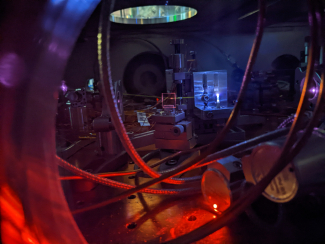An international team of researchers, led by JILA and NIST Fellow and University of Colorado Boulder Physics Professor Jun Ye and his team, has made significant strides in developing a groundbreaking timekeeping device known as a nuclear clock. Their results have been published in the cover article of Nature.
Unlike traditional atomic clocks that rely on electron transitions, nuclear clocks harness the energy jumps within an atom's nucleus, offering the potential for unprecedented precision in measuring time. Using thorium-229 nuclei and advanced laser technology, the team has achieved key milestones, including the highest precision measurement of nuclear transitions to date.
Read the full story on the NIST website.



 The Physics Frontiers Centers (PFC) program supports university-based centers and institutes where the collective efforts of a larger group of individuals can enable transformational advances in the most promising research areas. The program is designed to foster major breakthroughs at the intellectual frontiers of physics by providing needed resources such as combinations of talents, skills, disciplines, and/or specialized infrastructure, not usually available to individual investigators or small groups, in an environment in which the collective efforts of the larger group can be shown to be seminal to promoting significant progress in the science and the education of students. PFCs also include creative, substantive activities aimed at enhancing education, broadening participation of traditionally underrepresented groups, and outreach to the scientific community and general public.
The Physics Frontiers Centers (PFC) program supports university-based centers and institutes where the collective efforts of a larger group of individuals can enable transformational advances in the most promising research areas. The program is designed to foster major breakthroughs at the intellectual frontiers of physics by providing needed resources such as combinations of talents, skills, disciplines, and/or specialized infrastructure, not usually available to individual investigators or small groups, in an environment in which the collective efforts of the larger group can be shown to be seminal to promoting significant progress in the science and the education of students. PFCs also include creative, substantive activities aimed at enhancing education, broadening participation of traditionally underrepresented groups, and outreach to the scientific community and general public.